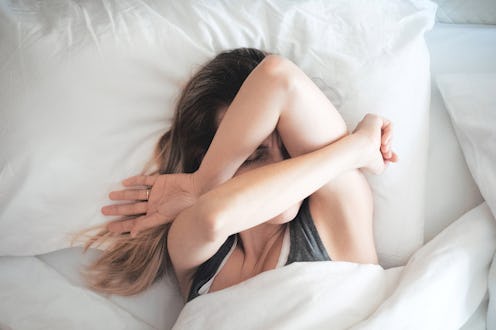Life
The EXACT Time To Take Melatonin To Help You Sleep, According To A Doctor
Melatonin is a naturally occurring hormone that the pineal gland in our brains release to regulate sleep. However, you probably hear more about the over-the-counter supplement version of melatonin, which people purchase in an effort to treat insomnia and jet lag. And it does work: melatonin can help you get to sleep if you're jet-lagged in a safer, more natural way than other sleeping aids. But, like any supplement, it does have to be used correctly; so understanding the optimal time to take melatonin to help you sleep is important, and requires understanding the natural and supplemental functions of the hormone, and how it can affect the entire scope of your sleep health. Just because it's a small pill that they sell at the grocery store doesn't mean it's not potent.
When functioning properly, our bodies release higher doses of melatonin at night when we're in the dark, and lesser doses of it in the morning when we're exposed to light. When melatonin is coursing through our bodies, we're tired and calm, and when the production of the hormone slows in the morning, we're able to feel alert and awake again. According to MIT, since a Dr. Richard Wurtman discovered that an extract of the hormone could be used as a sleep aid in 1994, people have been taking melatonin supplements to combat the effects of jet lag and mild insomnia. When taken in carefully curated doses, over a short period of time, by patients who were currently experiencing an irregular metabolization of the hormone, the supplement created an optimal internal environment for sleep. Patients who took melatonin could fall asleep faster, stayed asleep longer, and had an easier time getting back to sleep after an interruption in the night.
But after taking the supplement for a certain amount of time, it was noted that it lost its effectiveness. Why, you ask? This supplement has a sweet spot. Despite the fact that this is an easy-to-access over-the-counter pill, correct dosing is crucial. It's not meant to be a sleeping pill, it's only meant to help your body regain its natural ability to properly produce to the hormone on its own.
Knowing when to take melatonin and for how long is more important than most people realize. It's easy to ignore the instructions or underestimate the potency of the supplement because it doesn't require a prescription — so to clear things up once and for all, Bustle consulted with doctor and author Mike Dow, Psy.D., Ph.D, about how to take melatonin the right way.
As Dow tells Bustle, "unlike a prescription sedative where a little will make you a little sleepy and a lot is going to knock you out, melatonin works differently." Aka, don't treat it like a sleeping pill — it's an entirely different thing. Melatonin users should follow specified directions on the back of the bottle, which typically suggest taking melatonin 30 minutes before bed. So, whenever your bed time is, remember to take a melatonin 30 minutes prior — and that will be the optimal time for you, based on your sleeping schedule.
Dow also tells Bustle to "start low and go slow" as there can be "excess sleepiness and dizziness experienced as 'side effects,' which people often think is the sleep hormone working too well... Instead of reaching for that 10 mg dose, you can start with a smaller one - like 1 mg."
Even if you've tried melatonin in the past, you should always start small and work your way up to make sure you're not overdoing it. Dow says, "If you have trouble falling asleep, go for the standard melatonin supplement, if you have trouble staying asleep or waking up too early, try an extended-release melatonin."
In addition to melatonin (used correctly) Dow also recommends teaching oneself healthy sleeping strategies; especially because, as he says, humans naturally lose melatonin as we age, so having a good arsenal of healthy sleeping behaviors is crucial. Examples include not sleeping with the TV on, and keeping your bedroom dark and cool.
Bottom line: melatonin is a good option to take if you're looking for a natural sleep aid to help combat jet-lag or insomnia, but ensure that you're taking it 30 minutes before you want to sleep, that you're starting with a low dose, and that you're not taking it daily.
